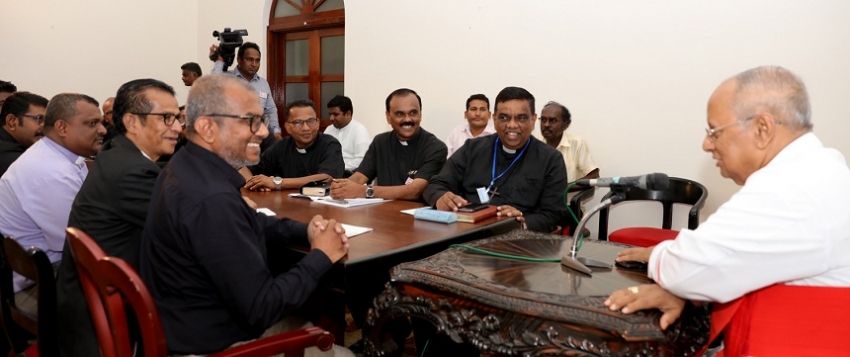Addressing the media at a press briefing, Rev. Canagasabey expressed his ideas on the Easter Sunday attacks and explained how to move on while preventing ethnic conflicts in the future. He stressed the importance of the unity of all religious leaders, youth leaders and, citizens in formulating suitable policies to build peace and overcoming ethnic, religious and ideological divisions in Sri Lanka. The younger generations should be educated about diverse traditions in Sri Lanka to prevent future conflicts, he said.
“An impartial view of our history since independence over 70 years ago would immediately show that the overriding tragedy of our country has been twofold. First, the inability to mould an identity as a single nation of the varied, peoples, rich diverse cultures, traditions and faiths that make up modern Sri Lanka. The second has been the incapacity of our political leadership to rise above their narrow party interests’ personal ambitions and the acquiring and retention of power and wealth for themselves, their families and party supporters,” he said.
He stated that all religious leaders, civil society, and youth leaders should come together, to overcome all ethnic, religious and ideological divisions, to formulate policies and to mobilise the people to rebuild Sri Lanka. He said that it was the time to work towards building a tolerant, just and peaceful new nation from the succession of tragedies that took place in the country.
Canagasabey said, “We need to educate our children. It is so essential that they are taught from their young days about the diverse and rich traditions of the many people that make up this nation. It is necessary to teach them to understand each other and of the need to accept, appreciate, live and work in harmony with all, for the shared common good for all.”
The Bishop said that due to the unrest following the Easter Day terrorist attacks, refugees, mainly Pakistani and Afghan, who were housed in private residences in and around Negombo were forced to leave due to rising tensions. He said the Anglican Church attempted to find them alternate accommodation, for a short time in a centre belonging to the National Christian Council of Sri Lanka in Athurugiriya, but this had to be aborted due to protests by area residents. They are presently being housed at the Negombo Police Station and Mosques in Negombo and Pasyala. “Since this is only a ‘stopgap’ measure we have appealed to the Government to consider other options at least in the short term,” he said.
He said that the country should not demonise the entire Muslim community for the acts of the extremists. “While the full force of the law must be applied on all those who planned, aided and carried out this unbelievable act of terror, the Muslim community must be treated with respect and understanding. This is how mature, generous and hospitable people like ours must react. As a Tamil having gone through the period of war when there was a tendency to look upon every Tamil as a potential terrorist, I fully empathise with the traumatised Muslim community living in fear and shame,” he explained.
The Anglican Church is a part of the global Anglican Communion, which has some 85 million members in about 50 different countries and regions. The Church has been present in this country since the end of the 18th century and formally since 1835.




















